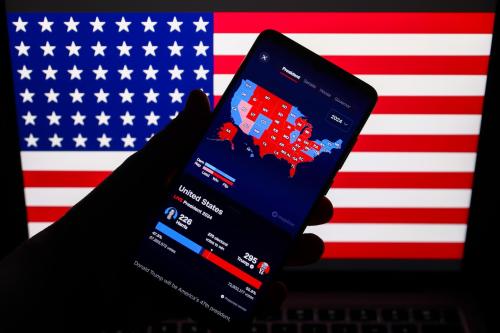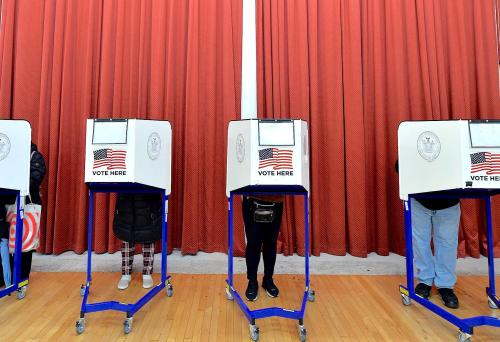Despite several high-profile debates and months of campaigning, no clear frontrunner has emerged in the crowded Republican field seeking the party’s nomination to oppose President Barack Obama in the 2012 election. The perceived lead has shifted rapidly among candidates, and party leaders are still urging others to jump into the race.
On October 5, Thomas Mann discussed the state of play in the GOP race and answered your questions as to why the field is still unsettled in a live web chat. The transcript of this chat follows.
12:28 Vivyan Tran: Welcome everyone. Let’s begin.
12:28 [Comment From Hank: ] Do you think there is a true frontrunner for the GOP yet?
12:31 Tom Mann: Romney is as close to a frontrunner as there is and has been for a very long time. Whether he can break through his 25% ceiling remains to be seen.
12:32 [Comment From Marianne: ] Why is the field so jumbled this year?
12:35 Tom Mann: At the beginning of the year, Obama appeared to be in a strong position for reelection and this discouraged some candidates from running. As the year went on, a number of promising Republicans decided not to run for a variety of personal and strategic reasons. The heart of the Republican party is now very conservative and searching for a candidate who reflects their views and who can also be elected in November. Whether such a candidate exists is very hard to answer.
12:35 [Comment From Wes: ] Why was the GOP so keen on having Christie run, and what do you think of his decision to sit this one out?
12:38 Tom Mann: Christie is smart, blunt, tough, funny and highly critical of Obama. He is governor of a blue state and has some touch with reality. That made him a much more plausible presidential candidate than almost everyone else who is running. Let’s be frank: Romney is the only one in the field who looks and acts presidential.
12:39 [Comment From Ray: ] Is everyone over Sarah Palin yet?
12:39 Tom Mann: Sarah Palin may not be but I suspect her time has come and gone.
12:40 [Comment From Jerry: ] Does the GOP have a problem with vetting? It seems like every time a candidate gets a leg up, some terrible information comes up about him or her.
12:42 Tom Mann: I don’t see a vetting problem. The information that has taken down rising candidates is not of a personal nature. Their weaknesses and flaws were there for anyone to see. The process is weeding them out before the first formal event. It’s working as it should.
12:42 [Comment From Jason: ] What do you make of the odd responses by people in attendance at the GOP debates? Things like cheering for executions and booing soldiers and whatnot?
12:44 Tom Mann: It reflects the very strong feelings of many activist Republicans. The party is now dominated by insurgents with strong views and high emotions. Such outbursts are jarring but not unexpected.
12:44 [Comment From Karen K: ] What impact will the lack of a strong GOP candidate have on Obama’s campaign?
12:48 Tom Mann: The perilous condition of the economy would ordinarily spell defeat for a sitting president seeking reelection. And it might in 2012 if a European financial crisis leads to a double-dip recession here at home. But Obama has a fighting chance of winning because of the weakness of the GOP presidential field and because the party may have moved too far from the mainstream of opinion to be trusted to take control of the White House.
12:48 [Comment From Nancy (DC): ] Can Rick Perry bounce back from this ugly stuff about his hunting cabin?
12:53 Tom Mann: Perry’s problems came well before this incident. His performances in the debate were widely criticized, he embraced radical interpretations of the Constitution, and—most tellingly—Tea Partiers jumped all over him because of his support for the Texas equivalent of the Dream act, allowing the children of undocumented aliens to qualify for in-state tuition at colleges and universities. He was seen as both too recklessly conservative and too liberal on immigration. He remains the only serious competitor of Romney, however, and the race for the nomination is far from over.
12:53 [Comment From Norman: ] Do you think Herman Cain will stick around in the polls or is this more of a flash in the pan?
12:54 Tom Mann: I expect his surge to the top tier in the contest will be short-lived, as was the case for Bachman. He is not a credible candidate for the presidency.
12:54 [Comment From Matt: ] With Christie out, do you think the field is set now? Or can we expect any new players?
12:55 Tom Mann: It is too late for a credible candidate to enter the contest. The field is set and any speculation to the contrary is personal or media hype.
12:56 [Comment From Jorge M.: ] To win their base and the nomination, it seems the candidates are leaning pretty far right. Will that hurt the eventual nominee in the general election? Is there any chance for a moderate candidate like Huntsman to emerge from this field?
12:59 Tom Mann: Huntsman has made no progress during the months of his candidacy. He is a terrible fit with today’s GOP—much too measured, practical, and unresponsive to some of the crazy nostrums that have become litmus tests for the party. Romney probably hurt his general election prospects by going after Perry so aggressively on immigration. And if Perry sticks around, Romney will have to continue to tack right, which would hurt him in November.
12:59 [Comment From Garth N.: ] Is it just me, or is it nothing short of amazing that candidates who deny climate change, and describe evolution as a theory that’s “out there” can actually be taken seriously? What has happened to public debate in this country?
1:00 Tom Mann: Sadly, many rank-and-file Republicans hold those beliefs and the candidates are catering to them. Sure doesn’t look like a grownup party to me.
1:00 Vivyan Tran: That’s it for today, thanks for the great chat everyone.
The Brookings Institution is committed to quality, independence, and impact.
We are supported by a diverse array of funders. In line with our values and policies, each Brookings publication represents the sole views of its author(s).



Commentary
Web Chat: The Unsettled GOP Presidential Race
October 5, 2011